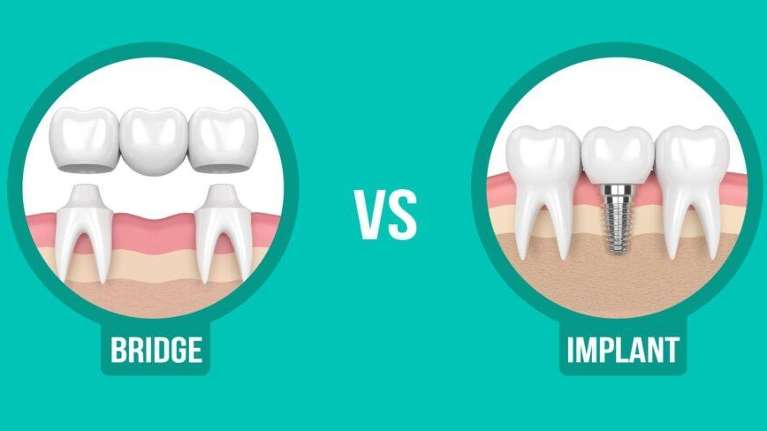
When it comes to replacing a missing tooth, two popular options are dental bridges and implants. Each has its own set of benefits and drawbacks, and the right choice often depends on individual needs and circumstances. In this blog, we'll explore the pros and cons of bridges and implants to help you make an informed decision.
Dental Bridges
Pros:
-
Quick Procedure: Dental bridges can often be completed in just a few visits. Once the surrounding teeth are prepared, the bridge can be placed, offering a quicker solution to tooth loss.
-
Lower Cost: Bridges typically cost less upfront compared to dental implants. For patients on a budget, this can make bridges a more accessible option.
-
Less Invasive: Unlike implants, which require surgery to place a post in the jawbone, bridges only require the reshaping of adjacent teeth. This makes the procedure less invasive and ideal for those who prefer to avoid surgery.
Cons:
-
Impact on Adjacent Teeth: To place a bridge, the healthy teeth adjacent to the gap need to be filed down to support the bridge. This can weaken these teeth and make them more susceptible to decay or damage in the future.
-
Harder to Clean: Cleaning around and under a dental bridge can be challenging, as food particles and plaque can get trapped beneath the bridge. This requires special flossing tools and meticulous oral hygiene to prevent gum disease and decay.
-
Longevity: While dental bridges are durable, they typically don't last as long as implants. On average, a bridge might last 10 to 15 years before needing replacement.
-
Bone Loss: Bridges do not address the issue of jawbone loss that can occur when a tooth is missing. Over time, the bone beneath the missing tooth may deteriorate, which can affect your oral health and facial structure.
Dental Implants
Pros:
-
Long-Term Solution: Dental implants are designed to be a permanent solution. With proper care, they can last a lifetime, making them a great long-term investment.
-
Preserves Jawbone Health: Implants are placed directly into the jawbone, which helps to stimulate and preserve the bone. This prevents the bone loss that often occurs with missing teeth.
-
Natural Look and Feel: Implants are designed to mimic the look and function of a natural tooth. They feel secure and comfortable, allowing you to eat, speak, and smile with confidence.
Cons:
-
Higher Cost: The upfront cost of dental implants is generally higher than that of bridges. However, considering their longevity, implants may be more cost-effective in the long run.
-
Lengthy Process: Getting a dental implant is a multi-step process that can take several months. It involves surgery to place the implant, followed by a healing period before the crown can be attached.
-
Surgical Procedure: Implant placement is a surgical procedure, which carries inherent risks such as infection or complications with anesthesia. Patients with certain health conditions may not be ideal candidates for implants.
Making the Right Choice
Choosing between a dental bridge and an implant depends on various factors, including your overall health, budget, and how quickly you need a replacement. At The Henderson Dentist, our team is here to guide you through the decision-making process, ensuring you choose the option that best suits your needs. We offer personalized consultations to discuss your oral health goals and provide expert advice tailored to your situation.
If you're considering a bridge or implant to replace a missing tooth, contact us today to schedule an appointment. We're committed to helping you restore your smile and confidence!
